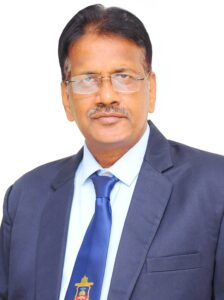
Prof. Subhash Chandra Parija
MBBS, MD, PhD, DSc, FRCPath,
FAMS, FICPath, FABMS, FICAI, FISCD, FIAVP, FIATP and FIMSA
Dr. Subhash Chandra Parija is Professor Emeritus, National Academy of Medical Sciences (NAMS), New Delhi. Prof. Parija was the former Vice-Chancellor of Sri Balaji Vidyapeeth, Pondicherry, and former Director, at the Jawaharlal Institute of Postgraduate Medical Education & Research (JIPMER), Pondicherry having nearly four decades of teaching and research experience in Medical Microbiology.
Prof Parija has been honoured by various organizations globally. He is a Food and Agriculture Organization (FAO) expert, being constituted to draft guidelines on food safety for parasites. Prof Parija was awarded WHO fellowships for the study of DNA probes, PCR and other molecular biological methods in the study of parasitic diseases at the University of Aberdeen, UK. Prof. Parija was a member of Research Advisory Board of BP Koirala Institute of Health Sciences, Dharan, Nepal, the member of Board of MD Examination in Parasitology, Colombo University, SriLanka, and the visiting Professor of the College of Medicine & Health Sciences, Sultan Quaboos University, Muscat, Oman, and Faculty of Medicine, University of Malaya, Malaysia. He is one of the very few Medical Microbiologists of India to be conferred DSc, highest degree in research, for his contribution in the field of Medical Parasitology by Madras University.
Author of ninteen books and several chapters on parasitic diseases, research and teaching, Prof Parija has published more than 400+ papers both in the National and International journals of repute. Some of his papers are quoted in textbooks and serial publications. His publications are highly cited and more than 150 of his papers were cited more than 10 times. Prof Parija has also published 2 patents and has 37 copyrights, and one technology transfer.
Prof. Parija has extensively worked in the medical parasitology. He has contributed extensively in several areas related to molecular parasitology, parasitic serology and immunology; epidemiology of parasitic diseases of zoonotic importance and stool microscopy. The development of simple, economical and rapid diagnostic tests in serodiagnosis of parasitic diseases and epidemiology of the parasitic diseases was Prof. Parija’s research interest. Prof Parija was the first to demonstrate that parasitic antigens are excreted in the urine in hydatid disease and cysticercosis, and urinary antigen could be detected for diagnosis of these two diseases. Prof Parija was first to report the detection of Entamoebahistolytica DNA in the urine and saliva for the diagnosis of amoebic liver abscess, report the prevalence of Entamoebamoshkovskii from India, evaluate a multiplex PCR for simultaneous detection of Entamoebahistolytica, Entamoebadisparand Entamoebamoshkovskii in stool specimens for diagnosis of intestinal amoebiasis, and to document Entamoebadispar infections in humans in Pondicherry, India.
Prof Parija and his team also for the first time documented and reported the genotype of Plasmodium falciparum drug resistance-associated genes; pvmdr-1 and pvcrt-o from Pondicherry and Jodhpur. Studied strain-specific phenotypes and the mechanism of gene regulation involved in chloroquine drug resistance using the whole transcriptome sequence profiling. Reported global comparative transcriptome profiling (RNA-Seq) to characterize the difference in the transcriptome between 48-h intraerythrocytic stage of chloroquine-sensitive and chloroquine-resistant Plasmodiumfalciparum (3D7 and Dd2) strains. Prof Parija and his associates for the first time documented and reported the subtype identification of Blastocystis in Pondicherry; and also documented severe Blastocystis subtype 3 infections in a patient with colorectal cancer.
He developed and evaluated the carbon-immunoassay (CIA) and staphylococci adherence test (SAT) as two simple rapid diagnostic methods using a light microscope; rapid IHA, protein A IHA, dot-ELISA for serum antibodies in the diagnosis of parasitic diseases; and co-agglutination (Co-A), latex agglutination test and CIEP for the detection of parasitic antigens in the serum and other body fluids in the patients.
Prof Parija was first to report the use of LPCB, KOH, etc in the wet mount preparation of stool for detection of intestinal parasites; suggested thick smear of the stool as a sensitive method for demonstration of intestinal parasites; suggested newer methods such as formalin-acetone method for concentration of stool.
Prof Parija conducted the knowledge, attitude and perceptions of rural people staying in two villages endemic for kala-azar in Nepal, reported the cases of Post-kala-azar dermal leishmaniasis, cases of imported cutaneous leishmaniasis, a case of kala-azar presenting with ulcers on the skin of the leg, a case of kala-azar without hepatomegaly and LD bodies-negative cases of kala-azar in Nepal; and cases of ocular rhinosporidiosis from Nepal. Prof. Parijaalso for the first time documented the prevalence of hydatid diseases, prevalence of enterobiasis in children, prevalence of Necatoramericanusand Ancylostomaduodenale infections, and intracameral gnathostomiasis from Pondicherry, India.
In recognition of his immense contributions in research in parasitic diseases, Prof Parija has been honoured with several awards both international and national. The international awards include BPKIHS Internal Oration Award conferred by BP Koirala Institute of Health Sciences, Dharan, Nepal.Various National awards including Dr BC Roy National Award of the Medical Council of India for contribution to the development of Medical Microbiology, Dr R.V. Rajam Oration Award of the National Academy of Medical Sciences, The Indian Association of Biomedical Scientists Award, Distinguished BHU Alumnus Award, Dr. PN Chuttani Oration Award of the National Academy of Medical Sciences, Prof. BK Aikat Oration Award by the Indian Council of Medical Research, Major General Saheb Singh Sokhey Award by the Indian Council of Medical Research, Dr SC Agarwal Oration Award of the Indian Association of Medical Microbiologists, Dr BP Pandey Memorial Oration Award of the Indian Society, Third Dr Datta Memorial Award by the Indian Association for the Advancement of Veterinary Parasitology, Dr. S.R.Memorial Award of the Bombay Veterinary College Alumni Association, IAPM Oration Award by the Indian Association of Pathologists & Microbiologists (Orissa Chapter), Smt. Kuntidevi Malhotra Award by the Indian Association of Pathologists & Microbiologists, Dr S.S. Misra Memorial Award by the National Academy of Medical Sciences, Young Scientist Award by the Indian Association of Medical Microbiologists, and Best Scientific Paper Award by the JIPMER Scientific Society, Pondicherry.
Professor Parija is currently, the Editor-in-Chief of the journal, Tropical Parasitology; Executive Editor of SBV Journal of Basic, Clinical and Applied Health Science (JBCAHS), Annals of SBV, Pondicherry Journal of Nursing, Journal of Scientific Dentistry; Editor of Topical series on HIV/AIDS and opportunistic diseases and co-infection, and Associate Editor of BMC Infectious Diseases, BMC Journal of Case Reports(JCR) BMC Research Notesetcin addition to being the member of the Editorial Board of many Journals.
Prof Parija has founded the Indian Academy of Tropical Parasitology, the only professional Organisation of Medical Parasitologists in India and propelled the Indian Academy of Tropical Parasitology (IATP) as the President of this organization to its present admirable position. He has also initiated the Tropical Parasitology, a journal with a prime focus on the tropical diseases caused by parasites as the official journal of the IATP. With an effort towards harmonizing the laboratory practices, he had initiated the IATP to conduct external quality assurance program throughout the country for diagnosis of parasitic diseases and Post graduate-fellowship programs in Tropical Parasitology at premier institutions across India.
He has been conferred with various fellowships such as FAMS Fellow, National Academy of Medical Sciences, FICAI (Fellow, Indian College of Allergy & Immunology), FABMS (Fellow, Indian Academy of Biomedical Scientists), FIMSA (Fellow, International Medical Science Academy), FISCD (Fellow, Indian Society of Malaria and Communicable Diseases), FIAVP (Fellow, Indian Association for Development of Veterinary Parasitology), FIATP (Fellow, Indian Academy of Tropical Parasitology) and FICPath (Fellow, Indian College of Pathologists) by professional bodies. Prof. Parija has visited many countries, delivered invited talks in parasitic diseases at universities, institutions, conferences, seminars etc, and has chaired scientific sessions in the international as well as national conferences. He has guided more than 30 MD students, 18 PhD students, and 30 MSc Projects and has been an examiner for MBBS, MD and PhD of various universities. Besides research, he is actively being involved in medical education, HR development and administration.
